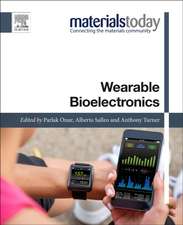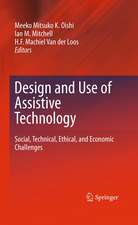Robotics in Healthcare: Field Examples and Challenges: Advances in Experimental Medicine and Biology, cartea 1170
Editat de João Silva Sequeiraen Limba Engleză Hardback – 18 feb 2020
The intersection of Robotics and Medicine includes socially and economically relevant areas, such as rehabilitation, therapy, and healthcare. Innovative usages of current robotics technologies are being somewhat stranded by concerns related to social dynamics. The examples covered in this volume show some of the potential societal benefits robotics can bring and how the robots are being integrated in social environments.
Despite the aforementioned concerns, a fantastic range of possibilities is being opened. The current trend in social robotics adds to technology challenges and requires R&D to think about Robotics as an horizontal discipline, intersectingsocial and exact sciences. For example, robots that can act as if they have credible personalities (not necessarily similar to humans) living in social scenarios, eventually helping people. Also, robots can move inside the human body to retrieve information that otherwise is difficult to obtain. The decision autonomy of these robots raises a broad range of subjects though the immediate advantages of its use are evident.
The book presents examples of robotics technologies tested in healthcare environments or realistically close to being deployed in the field and discusses the challenges involved. Chapter 1 provides a comprehensive overview of Healthcare robotics and points to realistically expectable developments in the near future. Chapter 2 describes the challenges deploying a social robot in the Pediatrics ward of an Oncological hospital for simple edutainment activities. Chapter 3 focuses on Human-Robot Interaction techniques and their role in social robotics. Chapter 4 focuson R&D efforts behind an endoscopic capsule robot. Chapter 5 addresses experiments in rehabilitation with orthotics and walker robots. These examples have deep social and economic relations with the Healthcare field, and, at the same time, are representative of the R&D efforts the robotics community is developing.
Din seria Advances in Experimental Medicine and Biology
- 9%
 Preț: 719.60 lei
Preț: 719.60 lei - 20%
 Preț: 691.93 lei
Preț: 691.93 lei - 5%
 Preț: 717.00 lei
Preț: 717.00 lei - 5%
 Preț: 716.28 lei
Preț: 716.28 lei - 5%
 Preț: 717.20 lei
Preț: 717.20 lei - 15%
 Preț: 640.24 lei
Preț: 640.24 lei - 5%
 Preț: 1113.83 lei
Preț: 1113.83 lei - 5%
 Preț: 715.71 lei
Preț: 715.71 lei - 5%
 Preț: 820.43 lei
Preț: 820.43 lei - 15%
 Preț: 641.38 lei
Preț: 641.38 lei - 5%
 Preț: 716.28 lei
Preț: 716.28 lei - 5%
 Preț: 523.99 lei
Preț: 523.99 lei - 5%
 Preț: 1031.00 lei
Preț: 1031.00 lei - 5%
 Preț: 717.00 lei
Preț: 717.00 lei - 5%
 Preț: 715.35 lei
Preț: 715.35 lei - 20%
 Preț: 1161.71 lei
Preț: 1161.71 lei - 5%
 Preț: 1170.51 lei
Preț: 1170.51 lei - 18%
 Preț: 1119.87 lei
Preț: 1119.87 lei - 5%
 Preț: 1288.48 lei
Preț: 1288.48 lei - 5%
 Preț: 1164.67 lei
Preț: 1164.67 lei - 5%
 Preț: 1101.73 lei
Preț: 1101.73 lei - 18%
 Preț: 1123.67 lei
Preț: 1123.67 lei - 5%
 Preț: 1435.64 lei
Preț: 1435.64 lei - 20%
 Preț: 1044.10 lei
Preț: 1044.10 lei - 18%
 Preț: 946.39 lei
Preț: 946.39 lei - 5%
 Preț: 292.57 lei
Preț: 292.57 lei - 18%
 Preț: 957.62 lei
Preț: 957.62 lei - 18%
 Preț: 1235.76 lei
Preț: 1235.76 lei - 5%
 Preț: 1231.55 lei
Preț: 1231.55 lei - 5%
 Preț: 1292.30 lei
Preț: 1292.30 lei - 5%
 Preț: 1102.10 lei
Preț: 1102.10 lei - 18%
 Preț: 1132.81 lei
Preț: 1132.81 lei - 5%
 Preț: 1165.19 lei
Preț: 1165.19 lei - 5%
 Preț: 1418.48 lei
Preț: 1418.48 lei - 5%
 Preț: 1305.63 lei
Preț: 1305.63 lei - 18%
 Preț: 1417.72 lei
Preț: 1417.72 lei - 18%
 Preț: 1412.99 lei
Preț: 1412.99 lei - 24%
 Preț: 806.16 lei
Preț: 806.16 lei - 18%
 Preț: 1243.29 lei
Preț: 1243.29 lei - 5%
 Preț: 1429.44 lei
Preț: 1429.44 lei - 5%
 Preț: 1618.70 lei
Preț: 1618.70 lei - 5%
 Preț: 1305.12 lei
Preț: 1305.12 lei - 18%
 Preț: 1124.92 lei
Preț: 1124.92 lei - 5%
 Preț: 1097.54 lei
Preț: 1097.54 lei - 15%
 Preț: 649.87 lei
Preț: 649.87 lei - 5%
 Preț: 1097.54 lei
Preț: 1097.54 lei - 18%
 Preț: 945.79 lei
Preț: 945.79 lei - 5%
 Preț: 1123.16 lei
Preț: 1123.16 lei
Preț: 877.15 lei
Preț vechi: 1096.43 lei
-20% Nou
Puncte Express: 1316
Preț estimativ în valută:
167.90€ • 182.43$ • 141.12£
167.90€ • 182.43$ • 141.12£
Carte disponibilă
Livrare economică 01-15 aprilie
Livrare express 15-21 martie pentru 31.72 lei
Preluare comenzi: 021 569.72.76
Specificații
ISBN-13: 9783030242299
ISBN-10: 3030242293
Pagini: 217
Ilustrații: IX, 128 p. 95 illus., 55 illus. in color.
Dimensiuni: 178 x 254 x 14 mm
Greutate: 0.5 kg
Ediția:1st ed. 2019
Editura: Springer International Publishing
Colecția Springer
Seria Advances in Experimental Medicine and Biology
Locul publicării:Cham, Switzerland
ISBN-10: 3030242293
Pagini: 217
Ilustrații: IX, 128 p. 95 illus., 55 illus. in color.
Dimensiuni: 178 x 254 x 14 mm
Greutate: 0.5 kg
Ediția:1st ed. 2019
Editura: Springer International Publishing
Colecția Springer
Seria Advances in Experimental Medicine and Biology
Locul publicării:Cham, Switzerland
Cuprins
Foreword.- Acknowledgements.- Can a Robot Bring Your Life Back? A Systematic Review for Robotics in Rehabilitation.- Smart and Assistive Walker – ASBGo . Rehabilitation robotics: a smart–walker to assist ataxic patients.- Mechanical sensing for lower limb soft exoskeletons: recent progress and challenges.- A Proposed Clinical Evaluation of a Simulation Environment for Magnetically-Driven Active Endoscopic Capsules.- Social Robots as a complementary therapy in chronic, progressive diseases.- Developing a Social Robot – A Case Study.- Index.
Notă biografică
João Silva Sequeira is an Assistant Professor at IST, Lisbon, Portugal and a Principal Investigator at ISR/IST, Lisbon, Portugal. He has coordinated several national and international projects related to Robotics and was recently responsible for directing the Monarch consortium where robots were tested in the medical setting.
Textul de pe ultima copertă
This edited collection is about Robotics in Healthcare. Challenges in the robotics-healthcare tuple are presented through reflections and case-studies, including field experiments.
As societies develop, well-being concerns tend to emerge and technologies are pressed to deliver solutions. Robotics and related technologies are currently undergoing an expansion to areas directly related to well-being. Healthcare is probably the most striking example.
The book covers rehabilitation and therapeutics topics, social robotics in the healthcare domain, and emerging technologies. The contents are organized along three principal directions. Rehabilitation forms the initial part, including challenges from the multidisciplinary nature of this domain, and current and prospective examples. A second direction points to the importance of having simulation tools where to train the mobility of an endorobot. The third direction focus on social robots, with a rehabilitation flavor, but also aiming at edutainment activities for children in hospitals.
The authors in this collective have backgrounds ranging from Engineering to Medicine and from Academia to field work and research. The materials in the book result, directly or indirectly, from their professional experiences, and from European and National R&D Projects, in which the authors have been involved.
The book aims at an audience deeply interested in field robotics in Healthcare and with the social concerns about the role of robotics in promoting well-being. The chapters are not overly technical. The challenges, as the case of privacy constraints in social robots, or as connecting a diversity of disciplines, are presented using an accessible language.
The book covers rehabilitation and therapeutics topics, social robotics in the healthcare domain, and emerging technologies. The contents are organized along three principal directions. Rehabilitation forms the initial part, including challenges from the multidisciplinary nature of this domain, and current and prospective examples. A second direction points to the importance of having simulation tools where to train the mobility of an endorobot. The third direction focus on social robots, with a rehabilitation flavor, but also aiming at edutainment activities for children in hospitals.
The authors in this collective have backgrounds ranging from Engineering to Medicine and from Academia to field work and research. The materials in the book result, directly or indirectly, from their professional experiences, and from European and National R&D Projects, in which the authors have been involved.
The book aims at an audience deeply interested in field robotics in Healthcare and with the social concerns about the role of robotics in promoting well-being. The chapters are not overly technical. The challenges, as the case of privacy constraints in social robots, or as connecting a diversity of disciplines, are presented using an accessible language.
Caracteristici
Effectively bridging technology and healthcare realities A reflection on the use of robots in healthcare An effort to raise the awareness about robotics in healthcare Identifying challenges in healthcare field robotics Paving the way to robots in healthcare























